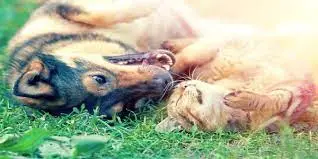
Last Updated July 28, 2023
You can see your ideal lawn now: soft green grass, the envy of all your neighbors and friends. The only problem? The last time you fertilized your own lawn, you almost sent your pet to the vet. Not good.
For many people, cats and dogs are like members of the family, so it’s important to know what lawn fertilizers could possibly harm them. Many commercial garden and landscape fertilizers contain ingredients that can be harmful to your cat or dog, particularly if ingested. In order to keep everyone safe, you need to know what to look for in a lawn fertilizer, when it’s safe to let your pet back on a fertilized lawn, and what steps to take if something does happen.
The Grounds Guys® explains some of the different lawn fertilizers and the precautions you should take to keep your pet safe. Also, we’ll discuss the signs to look for if your pet does come in contact with a recently fertilized lawn.
Table of Contents:
Is Lawn Fertilizer Safe for Pets?
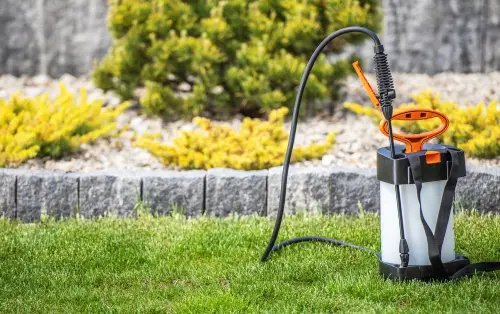
Depending on the size of your pets and the amount of fertilizer they ingest, lawn fertilizer can be toxic. If your pet consumes commercial lawn fertilizer, it could cause some serious health issues like abdominal pain, excessive drooling, vomiting, discolored gums, bowel obstruction, difficulty breathing, cardiac arrest, and even inflammation of the liver and pancreas. Therefore, it’s very important to keep your pets off any area of the lawn that has been recently fertilized.
Depending on the weather—rainy weather means quicker absorption—allow at least 1-2 days for the fertilizer to absorb into your lawn before letting your pets back on it.
Is Organic Fertilizer Safe for Dogs and Cats?
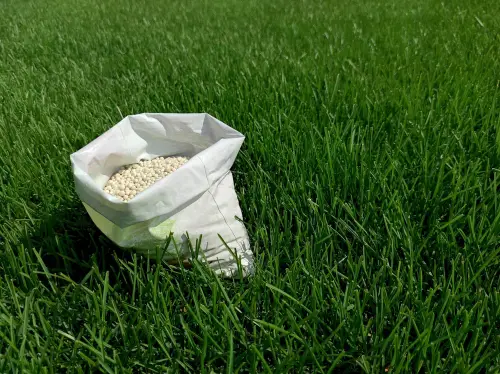
Organic fertilizer is widely considered to be a better choice for your lawn and the environment. Most people believe the ingredients in organic fertilizer are much safer, and feel more comfortable with organic versus synthetic fertilizer blends. However, “organic” doesn’t mean it’s safe for your pet. In fact, some organic fertilizers are made using animal products that may entice your cat and dog to eat them.
Just like commercial fertilizer, when it is ingested, organic fertilizer can cause digestive issues, intestinal obstructions, abdominal issues, and inflammation of the pancreas. So just because it says organic, it doesn’t mean it’s safe for your pet. Always read the fertilizer application and care instructions thoroughly before applying and don’t assume it’s safe just because it’s organic.
Related Topic: Selecting the Best Organic Fertilizer for Your Vegetable Garden
What Are Pet-Friendly Lawn Fertilizers?
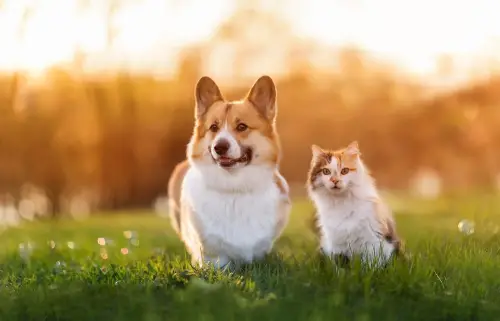
Pet-friendly fertilizers are a great option and will definitely cut down the wait time needed to safely allow your pet to roam your lawn. But again, just because it’s “pet-friendly” doesn’t mean it can’t harm your pet. The drying and absorption process will be quicker, but you still want to make sure your pet doesn’t go anywhere near the area during and right after the application process.
Once drying is complete, most pet-friendly fertilizers are completely safe. But when it comes to your pet, don’t take any chances. Always read the package instructions to confirm when you can safely let your pet onto the treated area.
Fertilizer and Pets: What to Know
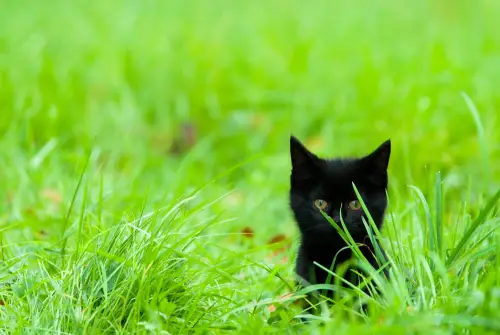
The most dangerous time for cats and dogs to ingest or come in direct contact with fertilizer is during and shortly after its application. Regardless of the type of fertilizer, cats and dogs should never be allowed to roam on a recently fertilized lawn. Allow a minimum of 48 hours after application before allowing your cat onto the lawn. Dog owners should keep their pets on a leash or closely supervised when outdoors until the fertilizer is completely dry.
After 48 hours, most fertilizers are considered safe for pets to roam around freely. However, it’s a good practice to always read the fertilizer warning label and follow proper application instructions; many state a specific period of time your pet must stay off the lawn. This “keep off” period can vary depending on the weather, brand, and type of fertilizer. And when it comes to storing and handling lawn fertilizer, it’s important to keep it stored in a safe place where your cat or dog can’t get into it and ingest it.
Granular products like lawn fertilizer absorb moisture from the air, causing them to cake. Storing your fertilizer in a large, air-tight plastic container will reduce the absorption of moisture and keep it safely away from your pet.
Fertilizer Poisoning Symptoms
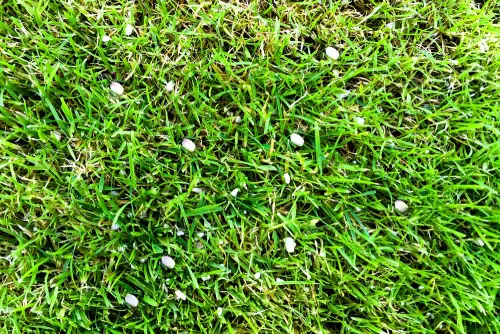
So how do you know if your cat or dog is exhibiting signs of fertilizer poisoning? You know your pet best and can usually tell when something isn’t right. Signs to watch for include vomiting, tremors and seizures, abnormal heart rate, severe lethargy, excessive drooling, frequent urination, or diarrhea. If you see your pet experiencing any of these symptoms, don’t wait; call your veterinarian immediately.
The quicker you can get your pet the medical attention they need, the better chance they will make a full recovery. Providing your vet with the type of fertilizer ingested can also be very important when it comes to treatment and recovery. So always keep a photo of the fertilizer ingredients on your phone for reference if needed.
Professional Lawn Fertilization Services from The Grounds Guys
Fertilizing your own lawn may seem like a relatively easy task, but it does come with some decisions and potential risks to the health of your pets. There are several factors to consider when choosing the right fertilizer for your lawn. Once you choose the fertilizer, knowing when and how much to apply will not only affect your lawn, it could affect your pets, too. Consider professional fertilizer services from The Grounds Guys to get the job done right.
To keep your lawn looking great and your pets safe, we recommend contacting your local lawn care professionals at The Grounds Guys to request a free estimate!